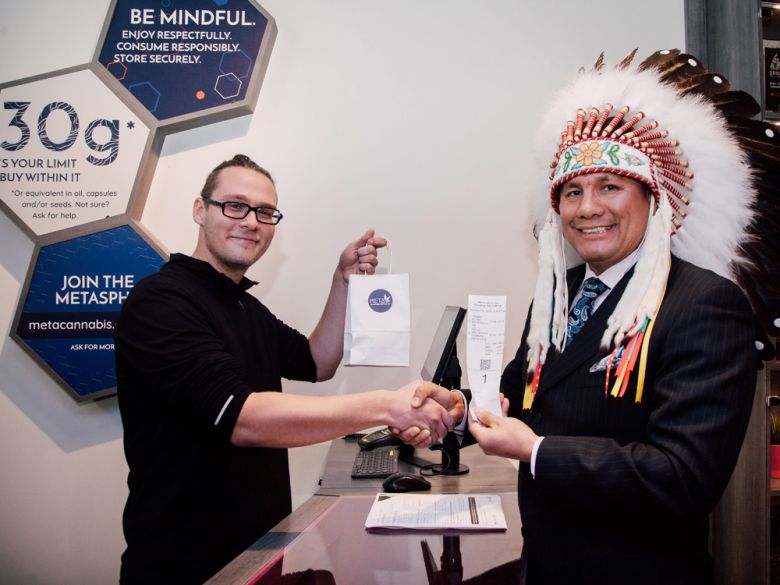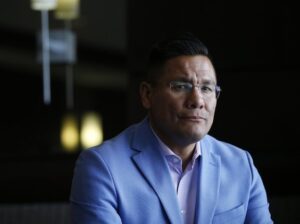Plans to grow from one to 50 or even 70 stores from its $3 million, 10% stake in NAC

From the Financial Post link to article by Vanmala Subramaniam November 6, 2018
About six hours north of Winnipeg, in the small town of Opaskwayak, Man., lies a 1,500-square-foot retail store, fully stocked with cannabis, ready for business.
On Wednesday, it will officially become the first licensed recreational cannabis store in Canada on First Nations land. But for Onekanew (Chief) Christian Sinclair, head of the Opaskwayak Cree Nation (OCN) the retail store is really just physical evidence, to his community, that joining forces with the legal cannabis industry was a smart idea.
“This is wonderful and I feel great. Our investment in cannabis has exceeded all of our expectations, and we want to show our people that this calculated risk, of investing in cannabis, has paid off,” Sinclair said.
Sinclair and the Opaskwayak Cree Nation have a 10 per cent stake in National Access Cannabis (NAC), a publicly traded Ottawa-based company that had been operating a series of health clinics focussed on medical marijuana prior to legalization.
In July, NAC was granted a license by the government of Manitoba to operate 10 retail cannabis stores, as well as an e-commerce platform.
Sinclair said the initial investment of $3 million in NAC has already paid off for the band.
“We have made more money in the last six months from our investment in NAC than we have in any other business venture. And we are only now, just scratching the surface of this industry,” Sinclair told the Financial Post over the phone from Opaskwayak.
The retail store, staffed by 11 band members, is located in Otineka Mall, a local hangout for the 2,500 or so members of the community. It is one of four stores that received an initial retail licence by the Manitoba government to sell pot, under the Meta Cannabis Supply Co. brand.
Over the summer, OCN expanded its involvement in the cannabis industry by entering into a $35 million debt-financing deal with NAC, with the goal of building 50 to 70 retail stores across Western Canada, including on First Nation reserves.
The ultimate goal, for Sinclair, is using the legal cannabis industry as a investment tool for the community — one that will hopefully generate enough money to “transform Opaskwayak” by investing heavily in education and infrastructure.
Legalization in Canada and Ontario has not affected us. We continue to run our businesses and create employment for almost 25% of our populationJamie Kunkel, owner, Smoke Signals stores on Indigenous lands
But Sinclair’s approach to legalization — teaming up with the legal cannabis industry — is not a strategy that some other First Nations communities necessarily approve of. For Jamie Kunkel, the owner of Smoke Signals, a chain of dispensaries across five different First Nations communities, adhering to the laws created by the Canadian government is something he is ideologically opposed to.
“We are not licensed by Canada or Ontario. We are on Indigenous land, and we have a right to do business on our land, as original peoples of this land,” Kunkel said. And that doesn’t prevent money from flowing in — the Tyendinaga Mohawk Territory, in southeastern Ontario is home to more than 40 dispensaries that employ roughly 400 people, according to Kunkel.
“Legalization in Canada and Ontario has not affected us. We continue to run our businesses and create employment for almost 25 per cent of our population,” Kunkel said. “When people come here to buy cannabis, they also stop at the restaurants, the gas stations. Every other business in this community that is not cannabis-related has seen an increase in traffic because of our dispensaries.”
But being part-owner of the first licensed cannabis store on First Nations land, is to Sinclair, the right path forward. “Look, I respect the right of every band, every community to do business in the way they want. For us, working with the legal cannabis industry is what will pay off.”
Correction: National Access Cannabis is not a licensed producer of cannabis, but has been awarded licenses to operate retail stores in Manitoba. In addition, Chuck Rifici is no longer affiliated with the company. Incorrect information appeared in a previous version of this story.

















Comments are closed.